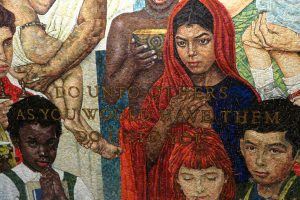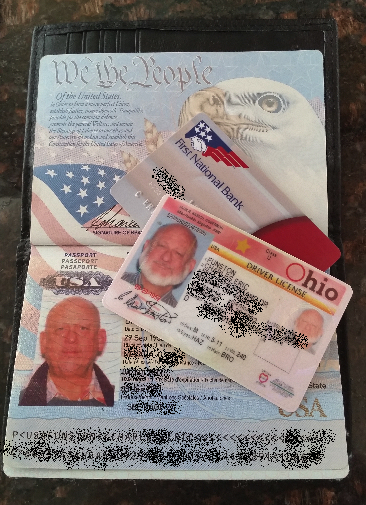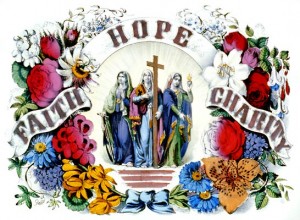====================
A homily offered by the Rev. Dr. C. Eric Funston on Trinity Sunday, June 11, 2017, to the people of St. Paul’s Episcopal Church, Medina, Ohio, where Fr. Funston is rector.
(The lessons for the service are from the Revised Common Lectionary: Genesis 1:1-2:4a; Song of the Three Young Men 29-34 (apocryphal verses found in some translations of Daniel 3); 2 Corinthians 13:11-13; and St. Matthew 28:16-20. These lessons can be read at The Lectionary Page.)
====================
 This is “Trinity Sunday,” the only Sunday of the Christian year dedicated to a truly puzzling Christian doctrine, the peculiar Christian notion that God is one-in-three and three-in one. The late Jim Griffiss, the seminary professor with whom I studied systematic theology, once quipped that one could walk into any church on Trinity Sunday and hear heresy preached; that’s because there is no good or easy way to explain this doctrine. There’s also no way to really understand this doctrine as a matter of intellectual assent. But as a friend of mine said recently, “We [are called to] worship one God in Trinity, not understand one God in Trinity. Accept the Mystery, sing the Te Deum, and move on.” (Facebook discussion) I think he’s right. As a way of describing God, one must admit that the doctrine of the Trinity seems paradoxical, more than a little bit ambiguous, and frankly beyond explanation in a short (or even a long) sermon. So, we won’t be singing the Te Deum today, but I would like to use some poetry to explore how we can experience and worship the Triune God.
This is “Trinity Sunday,” the only Sunday of the Christian year dedicated to a truly puzzling Christian doctrine, the peculiar Christian notion that God is one-in-three and three-in one. The late Jim Griffiss, the seminary professor with whom I studied systematic theology, once quipped that one could walk into any church on Trinity Sunday and hear heresy preached; that’s because there is no good or easy way to explain this doctrine. There’s also no way to really understand this doctrine as a matter of intellectual assent. But as a friend of mine said recently, “We [are called to] worship one God in Trinity, not understand one God in Trinity. Accept the Mystery, sing the Te Deum, and move on.” (Facebook discussion) I think he’s right. As a way of describing God, one must admit that the doctrine of the Trinity seems paradoxical, more than a little bit ambiguous, and frankly beyond explanation in a short (or even a long) sermon. So, we won’t be singing the Te Deum today, but I would like to use some poetry to explore how we can experience and worship the Triune God.
I was reintroduced during the past several months to the poetry of the Welsh Anglican priest R.S. Thomas and would like to begin our exploration of the Trinity with his poem The Bright Field (suggested to me for today by a seminary classmate).
I have seen the sun break through
to illuminate a small field
for a while, and gone my way
and forgotten it. But that was the
pearl of great price, the one field that had
treasure in it. I realise now
that I must give all that I have
to possess it. Life is not hurrying
on to a receding future, nor hankering after
an imagined past. It is the turning
aside like Moses to the miracle
of the lit bush, to a brightness
that seemed as transitory as your youth
once, but is the eternity that awaits you.
I’ll return to Thomas’s Bright Field, but first let me tell you about some other reading I’ve done recently.
A few weeks ago, I was reading in the news about conditions in the Middle East and elsewhere in the Muslim world and learned that the Islamic State in Syria (“ISIS” or “Da’esh”) has coined a new term to describe Western civil society. An essay published by Da’esh leadership just after the Charlie Hebdo massacre in Paris in 2015 called for the Extinction of the Grayzone, which is to say the secular West, which it described as the dwelling place of “hypocrites and deviant innovators.” (See Alternet) But the author of the news report I was reading offered a different take on the idea of a “gray zone” and suggested:
The gray zone is the zone of peaceful coexistence. Eliminating the gray zone and rendering a world as black & white as the flag of the Islamic state is the ultimate goal of fundamentalists on all sides. (Ahead of the News)
I filed that away as an interesting observation that might sometime be useful.
A few weeks later, this past week in fact, I was researching for this sermon, once again trying to find ways to explain the doctrine of the Trinity before deciding not to try to do so. In my researches I ran across a summary of an interview given several years ago by former Presiding Bishop Frank Griswold in which he lamented that when we put something other than the authority of scripture, the ancient creeds, the doctrine of the Trinity, and the nature of Christ at the center of our religious life we end up in a “very sorry situation” of division. He went on to describe our Anglican tradition as one which tries, instead, to be comprehensive:
The Episcopal Church is a questioning community. … It’s confident that Christ is at its center, and that gives it the courage to look at things that are difficult. It also is a church which has lived with open-ended questions. It doesn’t need to reduce things to absolutes. We can deal with shades of gray, we can deal with paradox and ambiguity without feeling that we are being unfaithful. (Father Jake)
In a word, we and our church are that “gray zone” which fundamentalists (and fundamentalisms) on all sides seek to eliminate; we model and offer to the world that “zone of peaceful coexistence” because we place the Trinity – this peculiar and confusing notion that God is one-in-three and three-in one – squarely at the center of life. And into this “gray zone” of paradox and ambiguity every so often comes that brightness, that flash of illumination of which poet Thomas wrote, that miracle of the lit bush, transitory as youth but holding the eternity that awaits us. We experience the Trinity even though we may not understand it.
God the Holy and Undivided Trinity is the eternal, archetypal Community, in whose image and likeness we, both as a species and as individuals, are created. Sinfulness, described in the Genesis story of the Fall, has seriously compromised human participation in that community; in terms of the theological metaphor of perichoresis, which envisions the life of the Trinity as a dance, we have taken a misstep. Through God’s grace, in Christ and in Christ’s Church, humanity is re-created in the Divine image and likeness, and invited once again into that Community, back into the dance with the Divine.
I chose the hymn called St. Patrick’s Breastplate (and stipulated all seven of its verses) as our opening hymn because it exemplifies how broad that Divine Community really is. The lyrics of the hymn are Cecil Frances Alexander’s rhythmic and rhyming paraphrase of an original found in the 9th Century Book of Armagh and titled in Latin St. Patrick’s Irish Canticle. In truth, the original is not a canticle or a poem of any sort; it is a protection charm or prayer of the form called a lorica.
The short first verse invokes God as Trinity, the three-in-one and one-in-three, but is more than in invocation. In the original it says, “I arise today” into the power of God; in Alexander’s translation, “I bind unto myself.” I lay claim to, I enter into, I become a part of the holy Community. C.S. Lewis described this Christian experience this way:
An ordinary simple Christian kneels down to say his prayers. He is trying to get into touch with God. But if he is a Christian he knows that what is prompting him to pray is also God: God, so to speak, inside him. But he also knows that all his real knowledge of God comes through Christ, the Man who was God – that Christ is standing beside him, helping him to pray, praying for him. You see what is happening. God is the thing to which he is praying – the goal he is trying to reach. God is also the thing inside him which is pushing him on – the motive power. God is also the road or bridge along which he is being pushed to that goal. So that whole threefold life of the three-personal Being is actually going on in that ordinary little bedroom where an ordinary man is saying his [ordinary] prayers. (Mere Christianity, Fount Paperbacks, London:1997, p.135)
Extraordinary! The brightness breaking through, as transitory as youth and yet the eternity that awaits us.
The second verse binds the singer to Christ, but in a remarkably holistic and complete way, laying claim to every aspect of the Incarnation of God, his birth and baptism, his death and resurrection, his ascension, and his future return on the last day. The lorica thus evokes the comprehensiveness that theologians call “the Christ Event,” the fundamental act of God in and through the flesh to redeem not only the individual but the whole of the cosmos, the entire created order. The third and fourth verses attest to this by invoking our ties to the religious and human community through all of time – cherubim, angels, and archangels; patriarchs and prophets; the apostles, and all the saints and martyrs in verse 3 – and to the community of nature – the stars, the sun, and the moon; fire and lightning; wind and sea; rocks and earth – in verse 4.
The theologian Raimon Panikkar describes the Trinitarian nature of reality. The Trinity, he says, is reflected in all of creation: in human beings we see the harmonious interrelationship of body, soul, and spirit, and in the physical world there is the triadic reality of space, time, and matter. “All beings,” he writes, “share what they are by being one with him, with the Son. All that exists, that is to say, all of reality, is nothing but God: Father, Son and Holy Spirit.” (Panikkar) Perhaps this is why the lectionary for Trinity Sunday always includes the reading of the Creation Story from Genesis; a reminder of our connection to the whole created order, a community which reflects its Creator.
The fifth verse of the hymn calls upon God’s various powers and aspects as protections against evils, both natural and human-caused – God’s vision, God’s hearing, God’s wisdom, God’s hand and shield. It is said that St. Patrick was inspired by St. Paul’s Letter to Ephesians when he first sang his lorica, by St. Paul’s admonition to
take up the whole armor of God, so that you may be able to withstand on that evil day, and having done everything, to stand firm. Stand therefore, and fasten the belt of truth around your waist, and put on the breastplate of righteousness. As shoes for your feet put on whatever will make you ready to proclaim the gospel of peace. With all of these, take the shield of faith, with which you will be able to quench all the flaming arrows of the evil one. Take the helmet of salvation, and the sword of the Spirit, which is the word of God. (Eph 6:13-17)
As we lay claim to faith in the Trinity by reciting or singing St. Patrick’s Breastplate, we do as Paul commanded, being thus assured that we are protected from all evils, many enumerated in two verses of the lorica not paraphrased by Alexander into her hymn: the snares of devils, temptations of nature, those who wish us ill, “the charms of false prophets, the black laws of paganism, the false laws of heretics, the deceptions of idolatry, [and] spells cast by [witches], smiths, and druids.”
The penultimate verse of the hymn both calls for and acknowledges Christ to be in all things, especially in all of the people we meet throughout any day. It is a reminder of Jesus’ promised words at the last judgment: “Just as you did it [or did not do it] to one of the least of these who are members of my family, you did it [or did not do it] to me.” (Mt 25:40,45) It also calls to mind St. Theresa of Avila’s timeless reflection:
Christ has no body but yours,
No hands, no feet on earth but yours,
Yours are the eyes with which he looks
Compassion on this world,
Yours are the feet with which he walks to do good,
Yours are the hands, with which he blesses all the world.
And it should also be a reminder that there are times for all of us when our lives (in Ben Sledge‘s unforgettable image) can be “a train wreck in a dumpster fire” and that at such times it is through other people’s eyes that Christ looks at us with compassion, through their feet that he walks to do good for us, that is through their hands that we receive his blessing. “Christ in hearts of all that love me, . . . in mouth of friend and stranger” is the sun breaking through to illuminate the small field of my life.
The last verse repeats the Trinitarian invocation of the first and reminds us that salvation is found not in the black-and-white of fundamental religious doctrine, but the “gray zone” of paradox and ambiguity, in the brightly lit “gray zone” of peaceful coexistence which is the dance of holy Community.
I want to end with another piece of poetry entitled Sonnet for Trinity Sunday by my friend, the English priest and poet Malcolm Guite:
In the Beginning, not in time or space,
But in the quick before both space and time,
In Life, in Love, in co-inherent Grace,
In three in one and one in three, in rhyme,
In music, in the whole creation story,
In His own image, His imagination,
The Triune Poet makes us for His glory,
And makes us each the other’s inspiration.
He calls us out of darkness, chaos, chance,
To improvise a music of our own,
To sing the chord that calls us to the dance,
Three notes resounding from a single tone,
To sing the End in whom we all begin;
Our God beyond, beside us and within.
====================
Father Funston is the rector of St. Paul’s Episcopal Church, Medina, Ohio.
 May God be merciful to us and bless us, show us the light of his countenance and come to us. (Ps. 67:1) Amen.
May God be merciful to us and bless us, show us the light of his countenance and come to us. (Ps. 67:1) Amen. Good evening! For those who don’t know me, I am Eric Funston, a priest of the Episcopal Church and rector of St. Paul’s Parish in Medina, Ohio. For those of you who don’t know why I’m preaching here tonight . . . I wish I could tell you! Usually these ordination or installation homily gigs go to someone with whom the new clergy person has had a, shall we say, formative relationship: a former pastor, a seminary professor or a ministry supervisor, an elder minister under whom the new pastor served a curacy, someone responsible for the priestly formation of the new rector. But that doesn’t describe me . . . I am not responsible for George Baum ~ and that is very probably a good thing!
Good evening! For those who don’t know me, I am Eric Funston, a priest of the Episcopal Church and rector of St. Paul’s Parish in Medina, Ohio. For those of you who don’t know why I’m preaching here tonight . . . I wish I could tell you! Usually these ordination or installation homily gigs go to someone with whom the new clergy person has had a, shall we say, formative relationship: a former pastor, a seminary professor or a ministry supervisor, an elder minister under whom the new pastor served a curacy, someone responsible for the priestly formation of the new rector. But that doesn’t describe me . . . I am not responsible for George Baum ~ and that is very probably a good thing!  On the day after the general election, a Presbyterian clergyman in Iowa, a married gay man, found a computer-printed note tucked under his car’s windshield wiper addressed to “Father Homo.” The text of the note began with the question “How does it feel to have Trump as your president?” and was both belittling and threatening. The same day a softball dugout in Island Park in Wellsville, New York, was defaced with graffiti reading “Make America White Again,” accompanied by a large swastika. The next day, students at nearby Canisius College, a Jesuit institution, found a black baby doll with a noose tied around its neck in the freshman dormitory elevator, and students at Wellesley College in Massachusetts witnessed two young white men drive a truck through their campus flying a Trump campaign banner, yelling “Make American Great Again,” and spitting on African-American young women.
On the day after the general election, a Presbyterian clergyman in Iowa, a married gay man, found a computer-printed note tucked under his car’s windshield wiper addressed to “Father Homo.” The text of the note began with the question “How does it feel to have Trump as your president?” and was both belittling and threatening. The same day a softball dugout in Island Park in Wellsville, New York, was defaced with graffiti reading “Make America White Again,” accompanied by a large swastika. The next day, students at nearby Canisius College, a Jesuit institution, found a black baby doll with a noose tied around its neck in the freshman dormitory elevator, and students at Wellesley College in Massachusetts witnessed two young white men drive a truck through their campus flying a Trump campaign banner, yelling “Make American Great Again,” and spitting on African-American young women. Tuesday was the Feast of All Saints (which we are commemorating today, as is permitted by tradition, by translating the feast to the following Sunday). Traditionally, All Saints Day (or All Saints Sunday) commemorates the departed members of the Christian church who are believed to have attained heaven (it is not limited to those officially canonized by a church hierarchy).
Tuesday was the Feast of All Saints (which we are commemorating today, as is permitted by tradition, by translating the feast to the following Sunday). Traditionally, All Saints Day (or All Saints Sunday) commemorates the departed members of the Christian church who are believed to have attained heaven (it is not limited to those officially canonized by a church hierarchy). 
 The kingdom of God, of which today we celebrate Christ as king, is not a kingdom of security; it is a kingdom of peace, dangerous peace.
The kingdom of God, of which today we celebrate Christ as king, is not a kingdom of security; it is a kingdom of peace, dangerous peace. Last week, I gave away the ending of Job. I told you that everything turned out all right in the end, and so it has. Job has repented, not of any sin that warranted his suffering, but of the pride and arrogance (and ignorance) he displayed during his suffering by demanding to confront God. God has forgiven him and to make up for all his loss, his fortunes have been restored many times over. Happy ending! Except not quite . . .
Last week, I gave away the ending of Job. I told you that everything turned out all right in the end, and so it has. Job has repented, not of any sin that warranted his suffering, but of the pride and arrogance (and ignorance) he displayed during his suffering by demanding to confront God. God has forgiven him and to make up for all his loss, his fortunes have been restored many times over. Happy ending! Except not quite . . .  So here’s a thing that happened this week . . . . We prepared the bulletins for today; both the church secretary and I reviewed them and proof-read them and only after they’d been copied and folded that I saw something out of order with today’s Psalm (as printed in the bulletin). It’s Verse 10….
So here’s a thing that happened this week . . . . We prepared the bulletins for today; both the church secretary and I reviewed them and proof-read them and only after they’d been copied and folded that I saw something out of order with today’s Psalm (as printed in the bulletin). It’s Verse 10…. In the Education for Ministry program, the first year is spent reading the Old Testament, parts of which can be as dull as dirt! There are those long lists of genealogies, long catalogues of tribes and families, the lengthy and detailed instructions for making and erecting the tabernacle that the Hebrews carried along with them in the desert and, of course, a description of the Temple which Solomon built. In our EfM group, we sort of got into a habit of not reading those parts, of just acknowledging they were there but sort of skipping lightly over them. But it is there, earlier in the First Book of Kings from which our First Lesson is taken, a description of the building in which, in today’s lesson, Solomon places the Ark of the Covenant. Solomon’s Temple (the “First Temple”) was massive; it wasn’t really very big, but it was solid and substantial. It was built of huge blocks of solid stone; it had support beams made of whole cedar trees; it had immense fixtures and columns made of solid bronze and gold. In a word, it was a fortress!
In the Education for Ministry program, the first year is spent reading the Old Testament, parts of which can be as dull as dirt! There are those long lists of genealogies, long catalogues of tribes and families, the lengthy and detailed instructions for making and erecting the tabernacle that the Hebrews carried along with them in the desert and, of course, a description of the Temple which Solomon built. In our EfM group, we sort of got into a habit of not reading those parts, of just acknowledging they were there but sort of skipping lightly over them. But it is there, earlier in the First Book of Kings from which our First Lesson is taken, a description of the building in which, in today’s lesson, Solomon places the Ark of the Covenant. Solomon’s Temple (the “First Temple”) was massive; it wasn’t really very big, but it was solid and substantial. It was built of huge blocks of solid stone; it had support beams made of whole cedar trees; it had immense fixtures and columns made of solid bronze and gold. In a word, it was a fortress!

